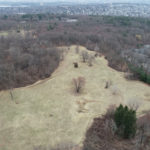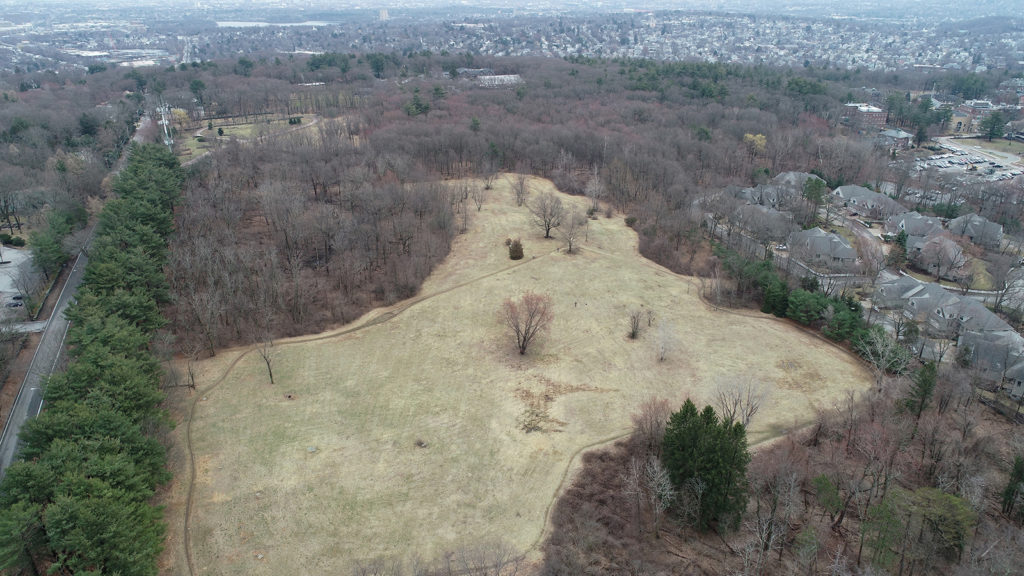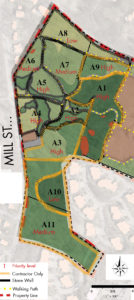
By Jeffrey North
The Land Management Committee for Lone Tree Hill approved plans and funding for three 2021 forest restoration and meadow management projects for Lone Tree Hill at a March 3 meeting. The Judy Record Conservation Fund is providing matching funds for the projects, for a total of $22,000 for these initiatives.
Area A1 Restoration Continues
In early spring, licensed field technicians trained in identifying invasive plant species will cut, mow, and apply plant-specific herbicide in the Area A1 woodland. They will combat Asian bittersweet, buckthorn, garlic mustard, black swallow-wort (Cynanchum louiseae), and lesser celandine, and at least one isolated patch of Japanese knotweed. This two-and-a-half-acre parcel was treated aggressively in early November 2020 (see “Committee Battles Invasives at Lone Tree Hill,” Belmont Citizens Forum Newsletter, January 2021). Weed removal in Area A1 will be combined with two other programs: seeding an annual cover crop of Canada wild rye (Elymus canadensis) to cover exposed soils for soil stability, and cut-and-dab herbicide application to remaining vines and invasive shrubs. The cut material will be left on site stacked in small piles to provide food, nesting, and shelter for wildlife.
Trained horticulturalists will return to Area A1 in mid-summer to continue the treatment of invasive plant species in the A1 woodland when they will again apply foliar herbicide to all invasive shrubs, resprouting vines, and black swallow-wort on the woodland edge. They will return in later summer to treat invasive species once again, specifically Japanese knotweed, black swallow-wort, and any resprouting plants that do not belong and which overrun native plant species. An autumn treatment of remaining and resprouting invasive plants should conclude activities for 2021 on this parcel.
Invasive Plant Management in the Great Meadow
To maintain the ecological health of the Great Meadow at the heart of the Lone Tree Hill property, field technicians will combat a host of invasive plants. Later in the season, when plants can be identified but have not yet produced mature seeds, field technicians will treat the meadow, optimizing for the control of black swallow-wort. In late spring, they will identify the black swallow-wort and treat it in meadow areas, and midsummer will see follow-up treatment.
Black swallow-wort is particularly concerning as it can crowd out native vegetation including native milkweed, goldenrod, and other field grasses and wildflowers. Loss of native plant species reduces biodiversity and compromises the value of habitat to wildlife. Monarch butterflies lay eggs on swallow-wort, which their caterpillars cannot eat, leading to the caterpillars’ death and threatening the species’ survival.
New Pollinator Meadow at Mill Street
A new pollinator meadow will be cultivated near the parking lot on Mill Street. The 6,400 square foot area near the bicycle rack just north of the parking lot will become a cafeteria for bees and birds.
After careful mowing, invasive plant species will be removed via hand-pulling and a foliar herbicide. Targeted species include Queen Anne’s lace, garlic mustard, burdock, and mugwort. In the fall, the area will be seeded with a mix of pollinator-supporting native wildflower seeds, including anise hyssop, purple coneflower, blazing star, foxglove beardtongue, black-eyed Susan, smooth aster, and others.
This new mini-meadow will improve the visual aesthetics of the entrance and the area opposite Rock Meadow as it supports pollen-spreading flower- and vegetable-friendly flying assistants for the area including the victory gardens across the street.
The Land Management Committee for Lone Tree Hill and visitors to the conservation land are once again grateful for the continued financial support and sage guidance from the board members of the Judy Record Conservation Fund: Roger Wrubel, executive director; Eugene Record, treasurer; and Gary Clayton, former president, Mass Audubon.
Jeffrey North is managing editor of the Belmont Citizens Forum Newsletter and the ex-officio Belmont Conservation Commission representative on the Land Management Committee for Lone Tree Hill.




Sorry, the comment form is closed at this time.